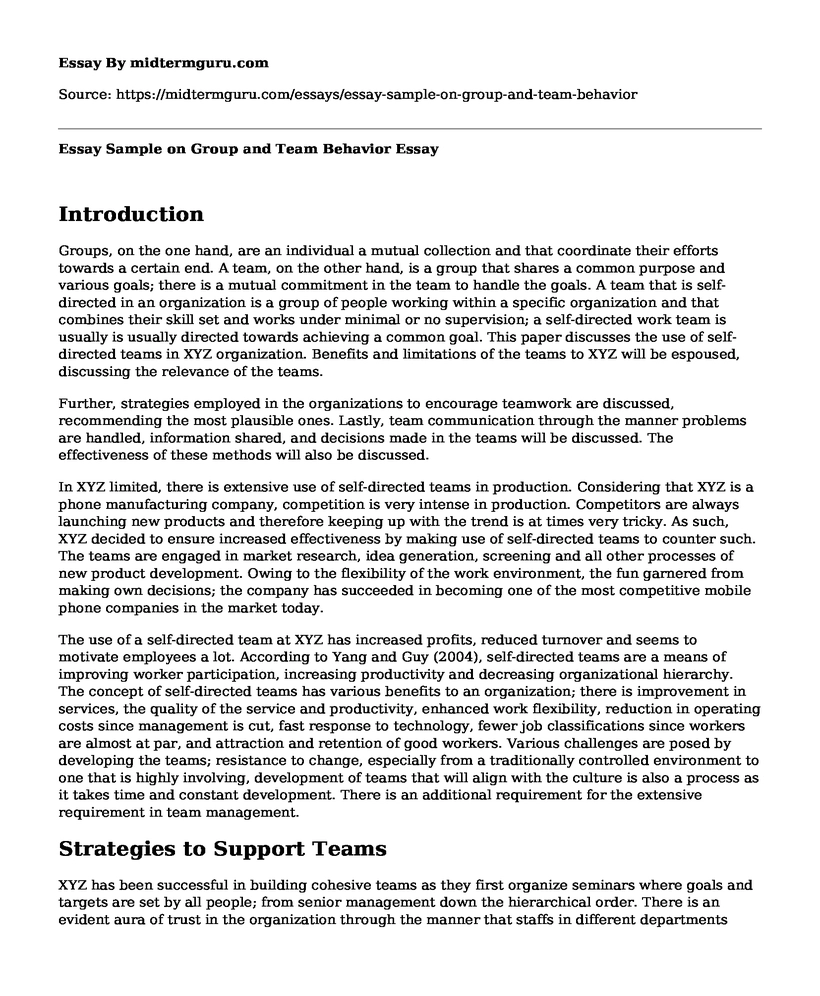Introduction
Groups, on the one hand, are an individual a mutual collection and that coordinate their efforts towards a certain end. A team, on the other hand, is a group that shares a common purpose and various goals; there is a mutual commitment in the team to handle the goals. A team that is self-directed in an organization is a group of people working within a specific organization and that combines their skill set and works under minimal or no supervision; a self-directed work team is usually is usually directed towards achieving a common goal. This paper discusses the use of self-directed teams in XYZ organization. Benefits and limitations of the teams to XYZ will be espoused, discussing the relevance of the teams.
Further, strategies employed in the organizations to encourage teamwork are discussed, recommending the most plausible ones. Lastly, team communication through the manner problems are handled, information shared, and decisions made in the teams will be discussed. The effectiveness of these methods will also be discussed.
In XYZ limited, there is extensive use of self-directed teams in production. Considering that XYZ is a phone manufacturing company, competition is very intense in production. Competitors are always launching new products and therefore keeping up with the trend is at times very tricky. As such, XYZ decided to ensure increased effectiveness by making use of self-directed teams to counter such. The teams are engaged in market research, idea generation, screening and all other processes of new product development. Owing to the flexibility of the work environment, the fun garnered from making own decisions; the company has succeeded in becoming one of the most competitive mobile phone companies in the market today.
The use of a self-directed team at XYZ has increased profits, reduced turnover and seems to motivate employees a lot. According to Yang and Guy (2004), self-directed teams are a means of improving worker participation, increasing productivity and decreasing organizational hierarchy. The concept of self-directed teams has various benefits to an organization; there is improvement in services, the quality of the service and productivity, enhanced work flexibility, reduction in operating costs since management is cut, fast response to technology, fewer job classifications since workers are almost at par, and attraction and retention of good workers. Various challenges are posed by developing the teams; resistance to change, especially from a traditionally controlled environment to one that is highly involving, development of teams that will align with the culture is also a process as it takes time and constant development. There is an additional requirement for the extensive requirement in team management.
Strategies to Support Teams
XYZ has been successful in building cohesive teams as they first organize seminars where goals and targets are set by all people; from senior management down the hierarchical order. There is an evident aura of trust in the organization through the manner that staffs in different departments interact; this facet of organizational leadership has been developed through constant team excursions aimed at developing strong ties amongst all. Importantly, the teams are empowered in such a way that any decision made collectively is rarely disputed at the higher echelons of the organization, making members very motivated. If the organization did not employ the strategies, I would recommend a reward system to be incorporated; such a system does not need to be necessarily monetary but can be as simple as a day off, an exclusive dinner for the members of the team and their spouses and any other encouraging actions as may be suggested.
Problem Solving in Teams
Teams become essential in problem-solving due to the great mix of skills amongst the members. With an assortment of skills, a problem is viewed from different angles, and a mixture of perspectives on various implications of choices is allowed. In XYZ, when a problem is found, it undergoes a series of seamless processes that lead to ensuring that it is ultimately solved. Firstly a problem needs to be recognized as existent and requires to be sorted out. At this stage, the problem is clearly defined to the rest of the members; this process involves clear mapping of the project. Further, members are given time to gather solutions and develop alternative solutions that are then ranked in eminence with the best-proposed solution implemented (McShane & Von Glinow, 2016).
Conclusion
In my opinion, the team method of problem-solving has been very effective at XYZ. Firstly, the team methods allow the members to come up with independent solutions that are then discussed and weighed in a manner that ensures that only the most plausible and effective decisions are implemented. Overly, the team benefits in this way by getting problems solved quickly and perfectly. If the organizations did not employ teamwork in the organization to solve problems, I would suggest outsourcing as a third party would be non-partisan to a decision. Also, XYZ can suggest focused discussions or set committees that would solely deal with the problem to its logical end.
References
Yang, S. B., & Guy, M. E. (2004). Self-managed work teams: Who uses them? What makes them successful?. Public Performance & Management Review, 27(3), 60-79.
McShane, S. L., & Von Glinow, M. A. (2016). M: Organizational Behavior (3rd ed.). New York, NY: McGraw-Hill.
Cite this page
Essay Sample on Group and Team Behavior. (2022, Oct 16). Retrieved from https://midtermguru.com/essays/essay-sample-on-group-and-team-behavior
If you are the original author of this essay and no longer wish to have it published on the midtermguru.com website, please click below to request its removal:
- Nutritional Planning for Preparing for Fitness - Paper Example
- Strategic Plan of Trader Joes Chain of Grocery Stores - Paper Example
- Summary of a Project Management Plan for the Coventry Football Championship
- Stock-Out: A Major Challenge for Tea Company T2 - Essay Sample
- Elements of Thought: Keys to Successful Critical Decision-Making - Essay Sample
- Motivating Employees: An Essential Management Responsibility - Essay Sample
- Leaders vs Managers: Who Steers the Sports Industry? - Essay Sample







